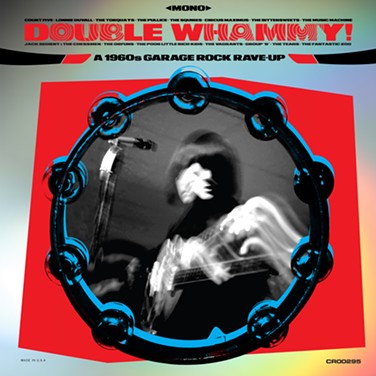If film icon Indiana Jones is…well…the Indiana Jones of finding lost or undiscovered archeological artifacts from far-flung locales, then Alec Palao is the Indiana Jones of Music.
Just picture him: Headphones in place on top of his cranium instead of a battered fedora as he sifts through dusty, forgotten boxes of reel-to-reel tapes, cassettes, and decades-old vinyl LPs and 45s. He’s searching the sonic landscape of a bygone era looking to strike gold – even if the original records never made even a copper level in sales.

Craft Recordings album cover
What producer/writer Palao does is search through the archives of record companies both still thriving and long forgotten to find songs, clean them up, put them in the proper historical perspective, and give them new life as reissues. His latest journey through the past—an exclusive for the second Record Store Day drop on October 24—is Double Whammy! – A 1960s Garage Rock Rave-Up (Craft Recordings).
As to what constitutes garage rock, it’s not so easy to pinpoint deeper than “the kind of music that ‘60s mostly suburban kids would make in their garages.” Sort of like in 1964 when Supreme Court Justice Potter Stewart, in a case involving pornography, said that he couldn’t describe it but uttered the words “I know it when I see it.” Or in this case, hear it.
“It’s never been properly defined. Garage rock can be ‘Louie Louie’ amateurishness or something more punchy like ‘Talk Talk’ or even frat boy sounds. And then it’s got more subgenres like garage folk!” Palao offers. “It’s also a misnomer that none of them had real [talent]. Some of it really has an intensity, musical intelligence, and attitude. So yes, it’s a very loose category. But not everything that has a grungy guitar and attitude is garage.”
Still, garage rock has some frequent characteristics: Snarling lead vocals, stinging guitar solos, a touch of Farfisa/Vox organs, and a fast, frenetic beat with often angry lyrics – often targeted at the singer’s girlfriend or crush. Many groups also sported dark clothing and what Palao calls “pudding bowl” haircuts.
Double Whammy! features 16 Palao-curated cuts from the Stax, Original Sound, Fantasy, and Vanguard label archives from the genre’s “golden period” of 1965-68. Most are from little known groups like the Orfuns (“The Animal in Me”), the Poor Little Rich Kids (“Stop – Quit It”), the Fantastic Zoo (“This Calls for a Celebration”), The Squires (“Anytime Anywhere”) and Texas’ own Circus Maximus, which featured a young Jerry Jeff Walker (“Short-Haired Fathers”). Jack Bedient and the Chessmen – actually more of a Las Vegas show band – provide the highlight track that gives the album its name. Though this collection is not meant to be “definitive” by any means.
Some bigger garage names are represented with the Vagrants (“I Can’t Make a Friend”), The Music Machine (the “full-length” version of “The People In Me”…clocking in at just 3:05). Palao even sent it to Music Machine guitarist Mark Landon, who didn’t even recall recording it that way. There’s also an unedited version of one of the genre’s most famous tracks, the Count Five’s “Psychotic Reaction.” Three of the songs have never been released before.
Incidentally, the Music Machine’s biggest hit and also a garage rock standard is “Talk Talk.” That’s not to be confused with the ‘80s band Talk Talk who had a hit with their own (but completely different) song called “Talk Talk.” Got that?
As Palao says in the liner notes, for whatever reason garage rock doesn’t enjoy the “crate digging fanaticism” that acolytes of Rockabilly, Northern Soul, or Psychedelic music do. Like many, his own first introduction to the genre was with Lenny Kaye-curated 2LP Nuggets compilation. It first appeared in 1972, and Palao heard it five years later. It’s still the basic primer on garage rock, and has spawned many sequels and a box set.
“The genre had all the excitement I was hearing in contemporaneous punk rock and new wave, yet it had all that wonderful ‘60s zeitgeist I was subliminally programmed with from the Beatles and what have you,” he says. “But it’s the stepchild of record collecting today. The snobby people felt it was amateurish knock offs of the Beatles or Stones or Yardbirds and the bands were one hit wonders.”
The much-ballyhooed “garage rock revival” of the early 2000’s featured a number bands whose named started with “The” (see Strokes, Hives, Vines, White Stripes). But Palao dismisses that as lazy music journalism.
“I would never called the Strokes ‘garage’ by any means. They were more a take-off of British groups of the ‘70s like Wire or the Fall. You don’t hear the vintage sound with them,” he says. Still, SiriusXM radio has its own Steven Van Zandt-led Underground Garage channel, labels like his Wicked Cool are signing new bands, and garage rock festivals (remember festivals?) book both classic and current bands.
“There’s a joke that a lot of people are looking backwards because there’s nothing to look forward to in the music business!” Palao laughs. “I’m hoping this record speaks to people who aren’t familiar with the genre and they’ll [investigate] more. But also to the real listeners for the alternate versions and [songs] that have never been reissued before.”
Palao says that his next musical exhumation for Craft will be a 4LP complete collection of the work of Dyke and the Blazers, a ‘60s soul/funk group who put out the original version of the oft-covered “Funky Broadway.”
“They were brilliant. I make the argument that they are as important as James Brown to the emergence of real street black music in America,” he sums up. “But that’s another conversation for another time!”